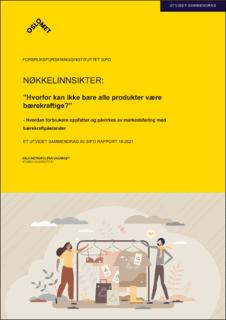”Hvorfor kan ikke bare alle produkter være bærekraftige?” Hvordan forbrukere oppfatter og påvirkes av markedsføring med bærekraftpåstander
Report

Permanent lenke
https://hdl.handle.net/11250/2838317Utgivelsesdato
2021Metadata
Vis full innførselSamlinger
- SIFO Rapport [329]
Sammendrag
Formålet med denne rapporten er å få en bedre forståelse av hvordan markedsføring med bærekraftpåstander kommuniseres til norske forbrukere gjennom nettbutikker og sosiale medier, og hvordan forbrukerne oppfatter og håndterer markedsføringen. Rapporten ser spesielt på to produktkategorier; klær og kosmetikk. En skrivebordsstudie analyserer markedsføringens tekstlige og visuelle utforming, og data fra fokusgrupper brukes for å forstå hvilke ressurser og begrensninger forbrukerne har i møte med markedsføringen. Skrivebordsstudien viser at markedsføringen av klær og kosmetikk benytter seg av store og felles samfunnsfortellinger om hvordan vi skal møte klimautfordringene gjennom forbruksendringer. Fortellingene bruker emosjoner, moral og logikk i sine argumenter, som forsterkes gjennom symboler og visuelle atmosfærer. Resultatene fra fokusgruppene viser at informasjon og kunnskap om markedsføring med bærekraftpåstander per i dag ikke er tilstrekkelig, og det er lav tillit til påvirkere i sosiale medier, forhandlere, og produsenter. Tilliten er høy til myndighetene, som samtidig anses å være ansvarlige for å regulere markedsføringen.
Rapporten avsluttes med fire læringspunkter for å utbedre forbrukernes forståelse av markedsføring med bærekraftpåstander:
i) standardisere og kontekstualisere informasjon,
ii) videreutvikle det nordiske miljømerket,
iii) regulere feilbruk av vitenskapelig kunnskap og
iv) lage retningslinjer for visuelle virkemidler. This report aims to gain a deeper understanding of how marketing with sustainability claims is communicated to Norwegian consumers through online stores and social media, and how consumers perceive and handle such marketing. The report looks specifically at two product categories: clothing and cosmetics. A desktop study analyses the textual and visual design of the marketing, and data from focus groups are used to understand what resources and limitations consumers have when facing sustainability claims. The desktop study shows that marketing of clothing and cosmetics are constructed using shared cultural narratives about how we should understand and act on the global climate crisis through changed patterns of consumption. The narratives use emotions, moral and logic in their arguments, which are reinforced through symbols and visual atmospheres. The focus group results show that information and knowledge about marketing with sustainability claims is insufficient, and there is a low level of trust in social media influencers, retailers, and manufacturers. There is a high level of trust in national authorities, who are also considered to be responsible for regulating marketing. The report concludes with four learning points to improve consumers’ understanding of marketing with sustainability claims: i) standardise and contextualise information, ii) further develop the Nordic eco-label, iii) regulate misuse of scientific knowledge, and iv) create guidelines for visual techniques in marketing.